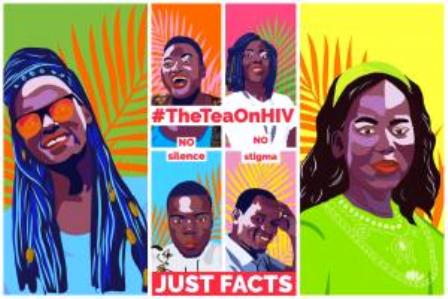#TheTeaOnHIV targets one million young Africans
As the 31st World AIDS Day approaches on 1 December, the World Health Organization (WHO) Regional Office in Africa yesterday (November 29), launched a social media campaign, #TheTeaOnHIV, that aims to better inform at least one million adolescents and young people about preventing HIV infection as well as living positively with the virus.
The campaign also intends to expand the cadre of HIV champions helping spread simple yet vital information on HIV and advocate quality adolescent- and youth-friendly health services.
Nearly 1.5 million of the 1.6 million adolescents living with HIV globally in 2018 were in sub-Saharan Africa. Around two thirds of HIV-positive adolescents in Africa who know their status acquired it through mother-to-child transmission.
According to UNAIDS data, only one in three young people globally has comprehensive knowledge about HIV and seven out of 10 young women (aged 15–24 years) in sub-Saharan Africa do not have comprehensive knowledge about HIV.
This places them at higher risk of contracting the virus and, at the same time, perpetuates stigma and alienation. Sexual health education and understanding about consent to sexual activity are crucial for young people to protect themselves.
Lack of proper information is harming adolescents and young people. While adults in Africa are increasingly dying of other causes, AIDS remains a leading cause of death among adolescents in high-burden countries.
In 2018, around 157 000 adolescents in sub-Saharan Africa were newly infected – 82% were girls and young women. In Kenya, according to government data, more than 51% of all new HIV infections in 2015 occurred among adolescents and young people (aged 15–24 years, up from 29% in 2013), with young women being twice as likely to contract the virus.
“We must stop leaving adolescents and young people behind. We need to do more to deliver stronger prevention strategies and adolescent- and youth-friendly health services – when and where they need them and in ways that they accept,” said WHO Regional Director for Africa Dr Matshidiso Moeti.
“This social media campaign aims to equip young Africans with the right information to start breaking the barriers that prevent them from getting support,” she added.
“Spilling the tea” is a common term on social media and means to talk factually and honestly about something. WHO recognizes that efforts to educate adolescents and young people about unhealthy behaviours as well as HIV have stagnated. There is need to renew open and frank discussions with this age group on the platforms that reach them, such as social media.
“I use Facebook and my YouTube page (“I Am a Beautiful Story”) to share my personal experience. It is one of the ways to normalize HIV,” said Doreen Moraa, 27, an HIV champion who participated in the launch event in Nairobi. “On my Facebook page (Doreen Moraa Moracha), I have declared: I am HIV-positive. I am not sick. I am not sad. I am not dying. I am just a fabulous host to a tiny virus.”
The campaign also advocates health services which respond to the unique needs of adolescents. WHO has developed eight global standards for the delivery of quality adolescent-friendly health services.
All the standards must be met if governments are to appropriately respond to the needs of adolescents, including: health services must be nondiscriminatory and protect adolescents’ right to privacy; they must engage adolescents and youth in their own care and at convenient times (available beyond school hours) and work with peers in service delivery.

